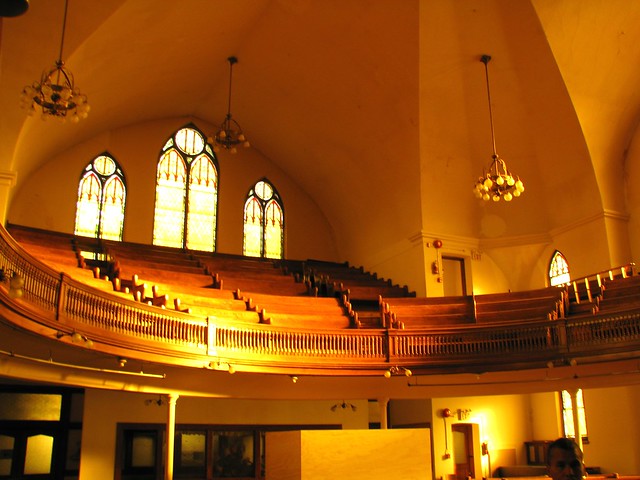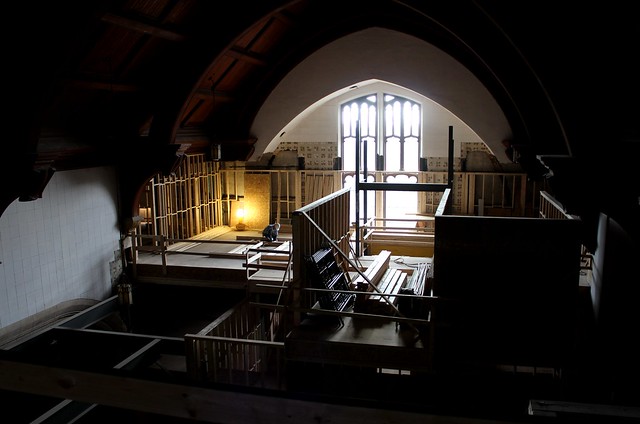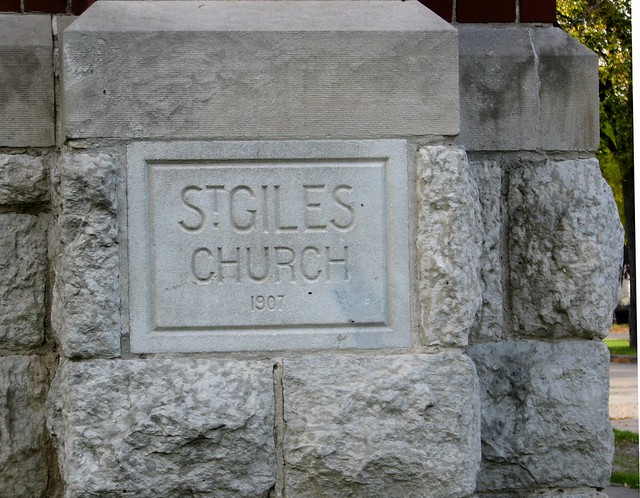At today’s meeting of the Historical Buildings and Resources Committee there will be an application to to de-list the former St. Giles Church, now the Bethlehem Aboriginal Fellowship, at 294 Burrows Avenue. It currently is a “Grade III” historical building under the city’s old heritage inventory, which is currently in transition to a new system. Grade III is the lowest level, indicating that a structure is a “moderately significant heritage example”.
In their application the owner, Canadian Baptists of Western Canada, include an engineer’s report that estimates the cost of repairs, including a new roof and a new foundation for the three storey annex, at nearly $2 million. For the organization and the church’s 35 members, it is too steep a price tag. In order to attract a buyer they pretty much have to de-list it so that they it can be demolished - there's not much of a market for 1000+ seat inner-city churches nowadays.
At this link you can read their application and here is the Historic Building Committee's history of the structure, including images of the original plans.
March 14, 1908 Winnipeg Free Press
Some building histories, including today's Free Press story, refer to St. Giles as being the first Presbyterian Church established in Winnipeg, which is not the case, (a correction has been submitted). Its formation took place in 1884 in an empty store at Main and Burrows, its congregation finding the trek to St. Andrews in Lockport to attend services daunting.
The first Presbyterian church in Winnipeg was, in fact, Knox Presbyterian Church, founded in 1868. To back this up, at the cornerstone ceremony for St. Giles in July 1907, Knox's Rev. F. B. Duval stated “As pastor of the oldest Presbyterian Church congregation in Winnipeg, it is to me a delight to join with others in hearty congratulations to St. Giles’ upon the excellent progress it has made.”
Soon after its formation, a proper church building was built on Selkirk Avenue. The current building was built in 1907 to hold 1,000 people, even though the congregation was not at that size yet.
Interior, St. Giles Church
At the cornerstone ceremony Reverend W. A. Maclean, St. Giles' long-serving minister, said “We trust and pray that the erection of this building may in years to come prove a blessing to the community in which it is situated and that the work so humbly begun twenty-three years ago may in God’s hands continue to prosper”
In the short term, St. Giles and other inner-city churches did prosper, but their longer term fortunes were bleak. As the city expanded, especially after World War II, their members flocked to new suburbs and built new churches. Since the 1960s church attendance in general began to fall off dramatically, meaning that new congregants were difficult to attract.
Some churches faced the wrecking ball and others were sold off by their original owners. In the case of St. Giles, the United Church sold it in 1973. It has since been a Mennonite and a Bapatist church.
This is an issue that is not going away. For the remaining grand churches of Winnipeg, congregations continue to shrink and repair bills mount. Eventually, the same tough decision will have to be made about each of them, historic designation or not.
Churches are one of the most difficult buildings to re-purpose but there have been success stories.
Most recently, St. Matthews Church on St. Matthews Avenue at Maryland Street recently converted into a 32-unit housing project called West End Commons, retaining a small chapel for church-goers and its basement full of community organizations.
There are a couple of significant differences between St. Matthews and St. Giles, however.
St. Matthews' original congregation is still there and were motivated to do something with the church before they found themselves in the same situation as St. Giles. Also, St. Matthews had made a conscious decision in the 1970s to stay put and serve its geographic community. As a result, its expansive basement houses a number of community organizations, including a daycare and new immigrant services, plus smaller "niche" congregations that share the chapel space.
For cast-off churches the West End Cultural Centre probably stands out as the best example of a space that has survived and thrived.
Sadly for St. Giles, it looks like its time quietly ran out.
UPDATE: The committee denied the application for de-listing.
Sources:
Manitoba Historical Society various entries
294 Burrows Winnipeg Historic Buildings Committee report (Nov. 1999)
Cornerstone of St. Giles' is laid Winnipeg Free Press, July 26, 1907
New St. Giles' is a beautiful edifice Winnipeg Free Press, March 14, 1908
Also see:
My Flickr album of St. Giles Church
My Flickr album of St. Matthews Church
St Giles' United Church diamond jubilee program Peels
107-year-old church in the North End faces demolition Winnipeg Free Press, June 18, 2015

















No comments:
Post a Comment